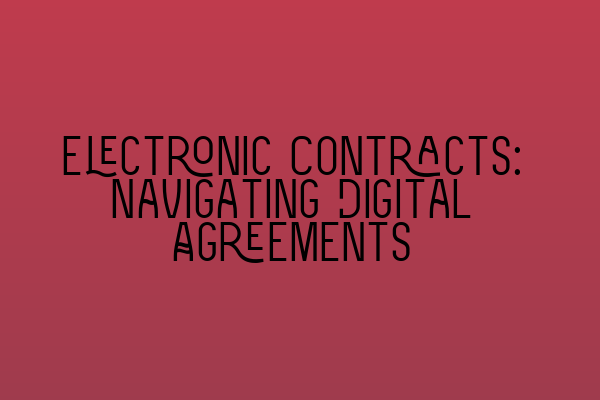Welcome to SQE Contract Law, where we provide expert guidance on all matters related to contracts and legal agreements. In today’s digital age, electronic contracts have become increasingly common, and navigating the world of digital agreements can sometimes feel like exploring uncharted territory. But fear not, as we are here to help you understand the ins and outs of electronic contracts, ensuring you can confidently navigate this digital landscape.
What are Electronic Contracts?
Electronic contracts, also known as e-contracts, are legally binding agreements entered into electronically. Instead of printing, signing, and exchanging physical documents, e-contracts allow parties to create, sign, and exchange contracts using electronic means such as email, online platforms, or specialized software.
With the advent of electronic signatures, the legal landscape has evolved to accommodate the use of electronic contracts. Electronic signatures can be as simple as typing a name or using a digital image of a signature, and they have the same legal effect as physical signatures, provided certain conditions are met.
Barrister vs. Solicitor: A Comprehensive Comparison
The Legality of Electronic Contracts
Many jurisdictions, including the United Kingdom, have implemented legislation to recognize the validity and enforceability of electronic contracts. In the UK, the Electronic Communications Act 2000 provides a legal framework for electronic signatures and contracts. This legislation ensures that electronic contracts have the same legal effect as their traditional counterparts, as long as certain conditions are met.
It’s important to note that not all types of contracts can be formed electronically. Some agreements, such as those required to be executed as deeds or those requiring witnesses, may still require a physical presence or specific formalities. However, for most commercial transactions, electronic contracts are now widely accepted and legally recognized.
Understanding the legality of electronic contracts is crucial, especially in a digital world where more and more business is conducted online. By familiarizing yourself with the legal requirements and frameworks surrounding electronic contracts, you can confidently engage in electronic transactions and protect your rights.
Exploring Different Solicitor Specializations: Finding Your Niche
Key Benefits of Electronic Contracts
There are several advantages that come with using electronic contracts:
- Efficiency and Time-saving: Electronic contracts streamline the contract process by eliminating the need for physical documents, postage, and manual exchange. This speeds up the negotiation, signing, and execution of contracts, allowing parties to close deals more quickly.
- Cost-effectiveness: Adopting electronic contracts reduces costs associated with printing, storage, and postage. Additionally, electronic signatures can eliminate the need for expensive courier services or in-person meetings for contract execution.
- Accessibility and Convenience: Electronic contracts can be accessed and executed from anywhere with an internet connection, eliminating the need for parties to be physically present in the same location. This accessibility and convenience make it easier to do business with international partners or clients.
- Audit Trail and Security: Electronic contracts often offer built-in audit trails, allowing parties to track and verify changes made during the negotiation process. Additionally, electronic storage provides a secure and easily accessible record of the contract, preventing the loss or destruction of physical documents.
Embracing the Rise of Virtual Law Practices
Key Considerations for Electronic Contracts
While electronic contracts offer numerous benefits, there are still some important considerations to keep in mind:
- Consent and Agreement: Just like traditional contracts, electronic contracts require the parties to have a meeting of the minds and mutually agree to the terms. This consent can be demonstrated through electronic means such as clicking a “I Agree” button or actively engaging in digital negotiations.
- Validity and Enforceability: To ensure the enforceability of electronic contracts, it’s important to comply with the legal requirements governing electronic signatures and contracts in your jurisdiction. This may include capturing and retaining evidence of the signing process and maintaining the integrity and authenticity of the contract.
- Security and Data Protection: Protecting the confidentiality and integrity of electronic contracts is essential. Implementing robust security measures, such as encryption and secure storage systems, can help safeguard sensitive information contained within electronic contracts.
- Technological Reliability: It’s crucial to ensure that the technology used for creating, sending, receiving, and storing electronic contracts is reliable and secure. Regularly updating software and systems, and backing up electronic contracts, will help mitigate the risk of data loss or system failures.
Navigating the Maze: Demystifying Ethical Responsibilities of Solicitors
Conclusion
Electronic contracts are an integral part of the modern business landscape, offering numerous benefits and efficiencies. By understanding the legality, benefits, and considerations surrounding electronic contracts, you can confidently navigate the world of digital agreements and enjoy the convenience and cost savings they offer. Remember to always seek legal advice from a qualified solicitor familiar with the intricacies of electronic contracts to ensure your rights and obligations are protected.
Unveiling Real-Life Case Studies: Insights into Legal Practice and Decision-Making
